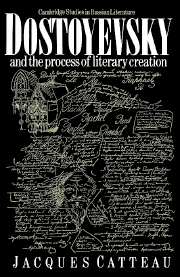Book contents
- Frontmatter
- Contents
- Preface to the English edition
- List of abbreviations
- General editor's note on transliteration and references
- General introduction
- PART I The creative environment
- PART II The process of creation
- Introduction
- 7 The writer at work
- 8 The great dialogue: the news item
- 9 The great dialogue: migrant images
- 10 The play of dialogue
- 11 The unity of thought in the novel
- 12 The summit of creative interrogation: ‘The Life of a Great Sinner’
- 13 A Raw Youth: reasons for choice
- 14 A Raw Youth: the appearance of the vision
- 15 A Raw Youth: the human architecture
- 16 A Raw Youth: the Idea of the novel
- 17 The composition of the novel in Dostoyevsky's work: choice of chronicle form
- 18 Composition of the novel in A Raw Youth: chronicle and stories
- Part III Time and space in the world of the novels
- Conclusion
- Notes
- Select bibliography
- Index of names
10 - The play of dialogue
Published online by Cambridge University Press: 18 December 2009
- Frontmatter
- Contents
- Preface to the English edition
- List of abbreviations
- General editor's note on transliteration and references
- General introduction
- PART I The creative environment
- PART II The process of creation
- Introduction
- 7 The writer at work
- 8 The great dialogue: the news item
- 9 The great dialogue: migrant images
- 10 The play of dialogue
- 11 The unity of thought in the novel
- 12 The summit of creative interrogation: ‘The Life of a Great Sinner’
- 13 A Raw Youth: reasons for choice
- 14 A Raw Youth: the appearance of the vision
- 15 A Raw Youth: the human architecture
- 16 A Raw Youth: the Idea of the novel
- 17 The composition of the novel in Dostoyevsky's work: choice of chronicle form
- 18 Composition of the novel in A Raw Youth: chronicle and stories
- Part III Time and space in the world of the novels
- Conclusion
- Notes
- Select bibliography
- Index of names
Summary
Humility is not the chief virtue of novelists. They do not hesitate to claim the title of creators. Creators! rivals of God!
In truth, they are his apes.
The characters they invent are not created, if creation means making something from nothing. Our so-called creatures are formed from elements taken from reality; we combine, more or less skilfully, the results of our observation of other men and the knowledge which we have of ourselves. The heroes of novels are born of the marriage which the novelist makes with reality.
François Mauriac, Le Romancier et ses personnagesSometimes novelists amuse themselves not by aping God – which is their basic task – but by aping themselves, telling us how one of their marriages with reality has ended in divorce. Once Dostoyevsky, usually secretive about his creative effort, chose himself as subject, the creating subject, though without admitting it openly. It is to the journalist of ‘Petersburg dreams in verse and prose’, published in Time in 1861, that we owe the amused self-portrait of the novelist watching himself in a mirror as he talks to his past, his dreams, his previous works, news items, migrant images. The self-portrait, like some self-portraits of Rembrandt, is spritely, but the eyes of the novelist shine with all their inspiration and wisdom. Before we begin our analysis of the subterranean logic of Dostoyevsky's creation, we shall give a brief illustration of his creative process and the game of dialogue in action.
- Type
- Chapter
- Information
- Dostoyevsky and the Process of Literary Creation , pp. 210 - 215Publisher: Cambridge University PressPrint publication year: 1989



